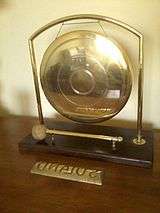gong
English

Gong (instrument)
Pronunciation
- Rhymes: -ɒŋ
Noun
gong (plural gongs)
- (music) A percussion instrument consisting of a metal disk that emits a sonorous sound when struck with a soft hammer.
- (Britain, informal) A medal or award, particularly Knight Bachelor
Translations
percussion instrument
|
|
Verb
gong (third-person singular simple present gongs, present participle gonging, simple past and past participle gonged)
- (intransitive) To make the sound of a gong; to ring a gong.
- 1903, H. G. Wells, The Truth About Pyecraft
- Poor old Pyecraft! He has just gonged, no doubt to order another buttered tea-cake!
- 1903, H. G. Wells, The Truth About Pyecraft
- (transitive) To send a signal to, using a gong or similar device.
- To halt (originally, a contestant in a talent show; later, a performer, a speaker).
- 1996, Stephanie Holt, Maryanne Lynch, Motherlode
- As she was gonged, host Daryl Somers swept rapidly across and salvaged an embarrassing situation by putting his arm around her and asking her whether she had children.
- 1996, Stephanie Holt, Maryanne Lynch, Motherlode
- To warn.
- The driver gonged the pedestrian crossing the tracks, but the pedestrian didn't stop.
- To halt (originally, a contestant in a talent show; later, a performer, a speaker).
References

Etymology 2
From Middle English gong, from Old English gong, where it was originally a variant of the noun gang (“a going, walk, journey, way, etc.”),[1] derived from the verb gangan (“to go, walk, travel”),[2] whose relation to go in Proto-Germanic remains unclear.[3] Doublet of gang.
Noun
gong (plural gongs)
- (obsolete) An outhouse: an outbuilding used as a lavatory.
- c. 1000, Aelfric, Homilies, Vol. I, p. 290:
- c. 1400, The Lay Folks Mass Book, Appendix iii, p. 125:
- a. 1513, Robert Fabyan, New Cronycles of Englande and of Fraunce, Vol. II, p. xxxii:
- The Iewe of Tewkysbury which fell into a Gonge vpon the Satyrday.
- a. 1577,, George Gascoigne, Grief of Joye, Vol. II, § lxii:
- (obsolete) The contents of an outhouse pit: shit.
Synonyms
- (outhouse): gonghouse; see also Thesaurus:bathroom
- (feces): See Thesaurus:feces
Derived terms
gong
- gong farmer, gong-farmer
- gong-fayer
- gong-fower
- gong-hole
- gong-house
- gong-man
- gongpit, gong-pit
- gong-thurl
Noun
gong
- (uncountable) A kind of cultivation energy, which is more powerful than qi.
- An advanced practice, that cultivates such energy.
References
- Oxford English Dictionary. "† gong, n.¹". Oxford University Press (Oxford), 1900.
- Oxford English Dictionary. "gang, n."
- Oxford English Dictionary. "gang, v.¹" & "go, v."
Dutch
Pronunciation
- IPA(key): /ɣɔŋ/
Audio (file) - Hyphenation: gong
- Rhymes: -ɔŋ
Indonesian
Malay
Etymology
Mandarin
Romanization
gong
Usage notes
- English transcriptions of Mandarin speech often fail to distinguish between the critical tonal differences employed in the Mandarin language, using words such as this one without the appropriate indication of tone.
Norwegian Bokmål
Synonyms
- gongong
Norwegian Nynorsk
Pronunciation
- IPA(key): /ɡɔŋː/
Etymology 1
From the verb gå
Noun
gong m (definite singular gongen, indefinite plural gonger or gongar, definite plural gongene or gongane)
- time
- Kor mange gonger hende det?
- How many times did it happen?
- Kor mange gonger hende det?
See also
- gang (Bokmål)
Synonyms
- gongong
Spanish
Alternative forms
See also
This article is issued from
Wiktionary.
The text is licensed under Creative
Commons - Attribution - Sharealike.
Additional terms may apply for the media files.